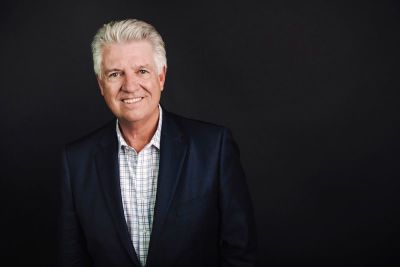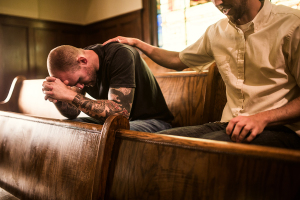Do we still need a shepherd in these modern times?
Sheep are funny creatures. They’re sociable, but they’re also liable to wander off. They remember things, but they also roll over on their backs and can’t get up without assistance.
That’s why they need a shepherd.

Throughout Scripture, we see God as a Shepherd and his people as sheep. An online search of the English Standard Version translation of the Bible yields 198 hits on the word “sheep” and 111 hits on the word “shepherd.” Clearly, God is trying to tell us something: We need him.
Right now, people are afraid, anxious and angry. God foresees this tendency toward mental strain in us and provides us a necessary salve in Psalm 23. In this famous psalm of King David, I see God communicating three truths to his people: he is a Shepherd of restoration, protection and celebration.
A Shepherd Who Restores Us
David was a shepherd before he was appointed king over Israel. He was intimately acquainted with sheep. He knew their habits and their quirks, defended them against predators, fed them and led them to water.
In Psalm 23:1-3, he writes:
“The Lord is my shepherd; I shall not want. He makes me lie down in green pastures. He leads me beside still waters. He restores my soul. He leads me in paths of righteousness for his name's sake” (ESV).
From the Psalms, we know David was often driven to despair. He faced countless enemies. He sinned. He understood he needed a Shepherd.
Charles Spurgeon’s perspective on these verses is particularly striking:
“There is a noble tone of confidence about this sentence. There is no ‘if’ nor ‘but,’ nor even ‘I hope so;’ but he says, ‘The Lord is my shepherd.’ ... He does not say, ‘The Lord is the shepherd of the world at large, and leadeth forth the multitude as his flock,’ but ‘The Lord is my shepherd….’”
When our lives are falling apart, we can rest in God as our personal Shepherd. He knows us better than we know ourselves and he can and will restore us.
A Shepherd Who Protects Us
God not only restores us, but he also protects us. David writes in verse 4:
“Even though I walk through the valley of the shadow of death, I will fear no evil, for you are with me; your rod and your staff, they comfort me.”
Suddenly, David is removed from the sunny, peaceful meadow to a desolate place where danger and death await. But he takes special comfort in his Shepherd’s rod and staff.
As David knew, a shepherd cannot be without a rod and a staff, which serve two primary purposes: to protect and to guide. A rod can fend off a predator and a staff can bring back an errant sheep.
David implies that God, as his Shepherd, protects him from external threats as well as the enemy within — himself. Therefore, David doesn’t have to fear evil. That doesn’t mean that he is throwing caution to the wind or is ignorant of the existence of evil — it means he no longer has to live in bondage to fear.
I remember receiving the horrifying news that my father had been murdered when I was 19 years old. I remember receiving my devastating cancer diagnosis in 2009. I remember the dark valleys of despair and depression. But God was with me in the midst of all of those horrible events. I wasn’t always aware of him and I often questioned him and became angry with him. But I know I wouldn’t have made it through without him. Our Shepherd is with us even when our circumstances seem to say otherwise.
A Shepherd Who Celebrates Us
I’ve always been awed by the biblical idea of God delighting in us. This is something David understood well. In verses 5 and 6, he writes:
“You prepare a table before me in the presence of my enemies; you anoint my head with oil; my cup overflows. Surely goodness and mercy shall follow me all the days of my life, and I shall dwell in the house of the Lord forever.”
Anointing with oil signifies consecration and blessing. David knew God had chosen him for his position. A prepared table and an overflowing cup are pictures of abundance. God has spread a feast for David, not because of anything David has done, but because God is generous and loving.
David’s response to this celebration tells us that he entrusts his past, present and future to his Shepherd.
We do not know what the coming days hold. It seems that the shadows of death loom long over us and that we have descended into darkness. Like sheep we stand on the path, hesitant to move forward. But our Shepherd is leading us onward. Although we don’t know where he is going, we can trust he will sustain us in the valley and will lead us through to the other side, where we will experience divine restoration and eternal celebration.
Dr. Jack Graham is the pastor of Prestonwood Baptist Church, one of the largest and fastest-growing churches in America. He is the author of the acclaimed Unseen, and his PowerPoint Ministries broadcasts are available in 92 countries and are heard daily in more than 740 cities. Follow him @jackngraham.



























